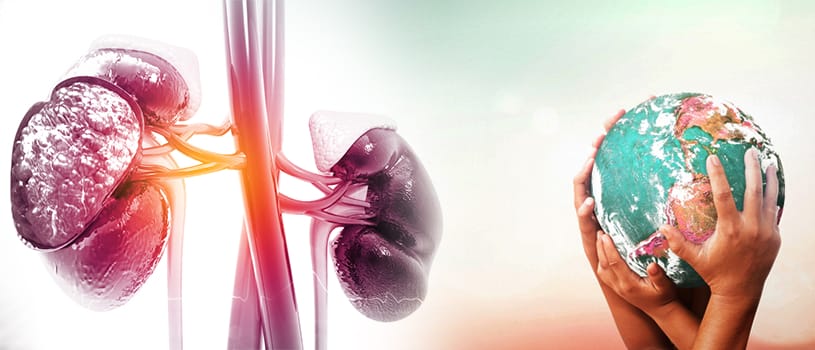Chronic kidney disease also known as chronic renal failure is a progressive condition in which kidneys lose their functioning potential slowly. The problem may take place over months or years. Eventually, the problem may progress to kidney failure if it goes untreated for longer. It is the most common type of kidney disease, and a large population is suffering from this kidney problem. Within the last few years, this problem has become prevalent, and therefore, it has come up as a global threat. Most countries are noticing a continuous increase in cases of kidney diseases. Usually, CKD patients do not know that they have CKD until they lose more than 70-80 percent of their function.
Consequently, chronic kidney disease often goes undetected in the early phase. Chronic kidney disease in the developing world has become a challenge as it mainly uses dialysis and kidney transplant to its cure. These procedures don’t provide a lasting cure, and many severe consequences are associated with these conventional healing ways.
What signs may a CKD patient develop?
As Chronic kidney disease advances to its later stages, abnormal waste levels and unwanted fluid can accumulate in the body. This accumulation can cause numerous symptoms to occur.If it comes to CKD symptoms, they are as listed as below:
- Frequently occurrence of infections
- Reduced red blood cells count
- Loss of appetite
- Blood in urine
- Swollen body parts, mainly ankles, feet, or hands
- Tiredness
- Problem in sleeping
CKD has different ill-effects on the body that vary from stages to stages. This problem turns worse over time. The modern treatment method has shown to slow the disease’s progression; due to its limitations, it can’t offer a permanent cure. All it aims to do is, slowing the progression of CKD in order to prevent kidney failure. It’s not necessary that every chronic kidney patient may develop kidney failure. If it comes to prevent chronic kidney disease, one should try to control risk-factors of CKD by making some lifestyle changes, take routine tests even if you feel healthy, include some physical exercises in your routine, do breathing exercises, and take medicines for the risk factors whenever needed.
What factors are responsible for CKD?
Chronic kidney disease is a long process that mainly occurs due to poor routine habits followed over a long period. Medical conditions, such as diabetes and high blood pressure, are the two top causes of chronic kidney disease and account for around 90 percent of all chronic kidney problems. Apart from these factors, there are many other factors responsible for chronic kidney disease: Glomerulonephritis, Autoimmune disease, polycystic kidney disease, kidney infection (Pyelonephritis), and prolonged urinary tract infection, recurrent urinary tract infections, dehydration, etc.
If you have any of these health conditions or factors, try to cure, eliminate, or avoid them to reduce chronic kidney disease risk. When you develop chronic kidney disease, your physician aims to stop or slow down CKD progression by controlling its underlying factors. Early diagnosis and opting for the right treatment immediately can be beneficial in CKD cure.
The best treatment for CKD
Chronic kidney disease requires the best treatment as soon as possible. The early, a CKD patient takes the treatment, the better and higher chance of their recovery. Allopathy is a modern healing method that mainly works on CKD complications and slows down this problem’s worsening; it can’t stop CKD progression. Moreover, if a CKD patient has to take dialysis frequently, he may develop some serious consequences after some sessions of this artificial treatment procedure. For the advanced stage of CKD or kidney failure, Allopathy suggests a kidney transplant. It’s a kind of surgery, and therefore it has many complications due to the complexities involved in this process. This modern treatment system can only manage kidney problems but can cure them permanently. It has many side-effects; thus, it can prove risky instead of being useful.
On the other hand, if you choose the best Ayurvedic treatment for chronic kidney disease in the developing world, it can provide a permanent cure. Ayurveda is a natural healing program that is derived from ancient Indian Vedas. This treatment follows a holistic healing approach in which it works on the disease as well as the parthenogenesis and underlying causes of the problem to provide a permanent cure. In CKD, Ayurveda follows its ancient and effective healing method that targets the disease in several ways.
Chronic kidney disease treatment in Ayurveda works on eliminating complications and also reversing the disease’s progression using some natural cures and care. In short, this natural treatment removes CKD complications from your body by restoring kidneys. Eventually, after following chronic kidney disease treatment in Ayurveda, a patient gets his natural kidney health and functioning, and therefore, kidneys become capable of performing their natural functions independently. Ayurvedic treatment does all without putting any side-effects on your health.
Select a reliable Ayurvedic kidney hospital to acquire the best chronic kidney disease treatment for reversing this problem naturally.


Could you please suggest me the best Ayurvedic Hospital in India for CKD treatment. Kidney shrinkage.
Here, we are available for treatment ckd in Ayurveda and cure all kind of kidney disease problems in the natural way. That’s why, during the ckd treatment, we just use only ayurvedic medicines which are very effective and giving the patient relief from the complications of ckd.
Furthermore, if you are having any type of confusion as regard of ckd doctors, so contact with us on this number. – 011-4777-2777, +91-9871712050